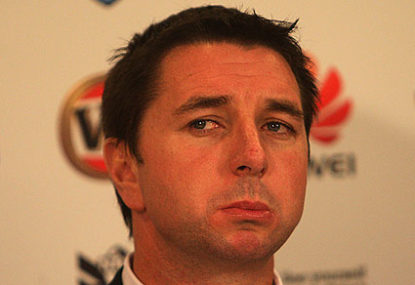Sharks too smart in the wet for hot-and-cold Dragons to make an unhappy homecoming for Flanagan
To paraphrase Bill Woodfull, there were two teams out there at Shark Park on Sunday but only one of them was playing wet-weather footy.…

The St George Illawarra Dragons are a club undertaking a significant rebuilding phase. The club has been forced in to this predicament as a result of winning the 2010 rugby league premiership.
Success comes at a price.
Premiership winning players demand more value, attract more interest from rival clubs and often are the beneficiaries of performance based contract incentives.
This causes a successful club to face significant the salary cap pressures and forces it to make some tough personnel decisions.
Ultimately, the result is that players leave or are released and clubs are back to square one, that is, forced into a rebuilding phase, in pursuit of their next premiership.
The difficulty with rebuilding phases is that they require patience from supporters and club decision makers alike. Sounds easy in theory, but proves to be difficult in practice. This is because rugby league, like most sports today, is a results driven business, which is largely determined by on-field success.
This places a coach in a difficult predicament when he or she is faced with rebuilding a club.
If on-field performances are poor, the coach comes under increased pressure to turn around the team’s performance quickly. This may lead to a departure from the long term plan which the coach is in the process of implementing.
The coach may be tempted into quick fix solutions to turn around performance in the short term and to help reassure his or her own position.
Steven Price, coach of the Dragons, is one person currently facing this dilemma. The Dragons brand is built on the premiership glory it tasted in the 1950s and 1960s. It is a club whose supporters have very high expectations and demand constant success.
Price has been forced to rebuild the club following the Bennett era. However, the cost of rebuilding has meant that the Dragons have performed very inconsistently this season.
Inconsistent performances have led to increased scrutiny surrounding Price’s future at the club.
Price is trying to orchestrate a long term plan to turn the side into a premiership contender once more, but appears to be doing so with one eye firmly focused on this season’s results.
Price is clearly feeling the pressure of expectation.
This has led to Price preferring experience over youth when it comes to team selection.
Such an approach appears to be at odds with a rebuilding policy. For example, Price has persisted in playing veteran, Nathan Fien, at halfback this season, despite the arrival of the talented 2012 NYC Player of the Year, Josh Drinkwater, during the off-season.
Fien has been an excellent contributor to the club and is a deserving premiership winner. However, he is a dummy half and plays his best footy there.
The decision not to blood Drinkwater is a perplexing one.
Perhaps there are behind the scene reasons dictating this decision.
However, it is at odds with the rebuilding process which the club is embarking on.
Where the Dragons finish on the competition ladder this season is irrelevant, but the coach appears not to see it that way.
Price knows that he will be closely judged on this season’s results, despite the fact that he has been given the task of rebuilding the club’s playing roster. Such are the high expectations of the Dragons faithful.
Is committing to a rebuilding phase and experiencing short term pain acceptable in the results driven world of modern day sport? The decision making at the Dragons in recent times tends to suggest it is not.